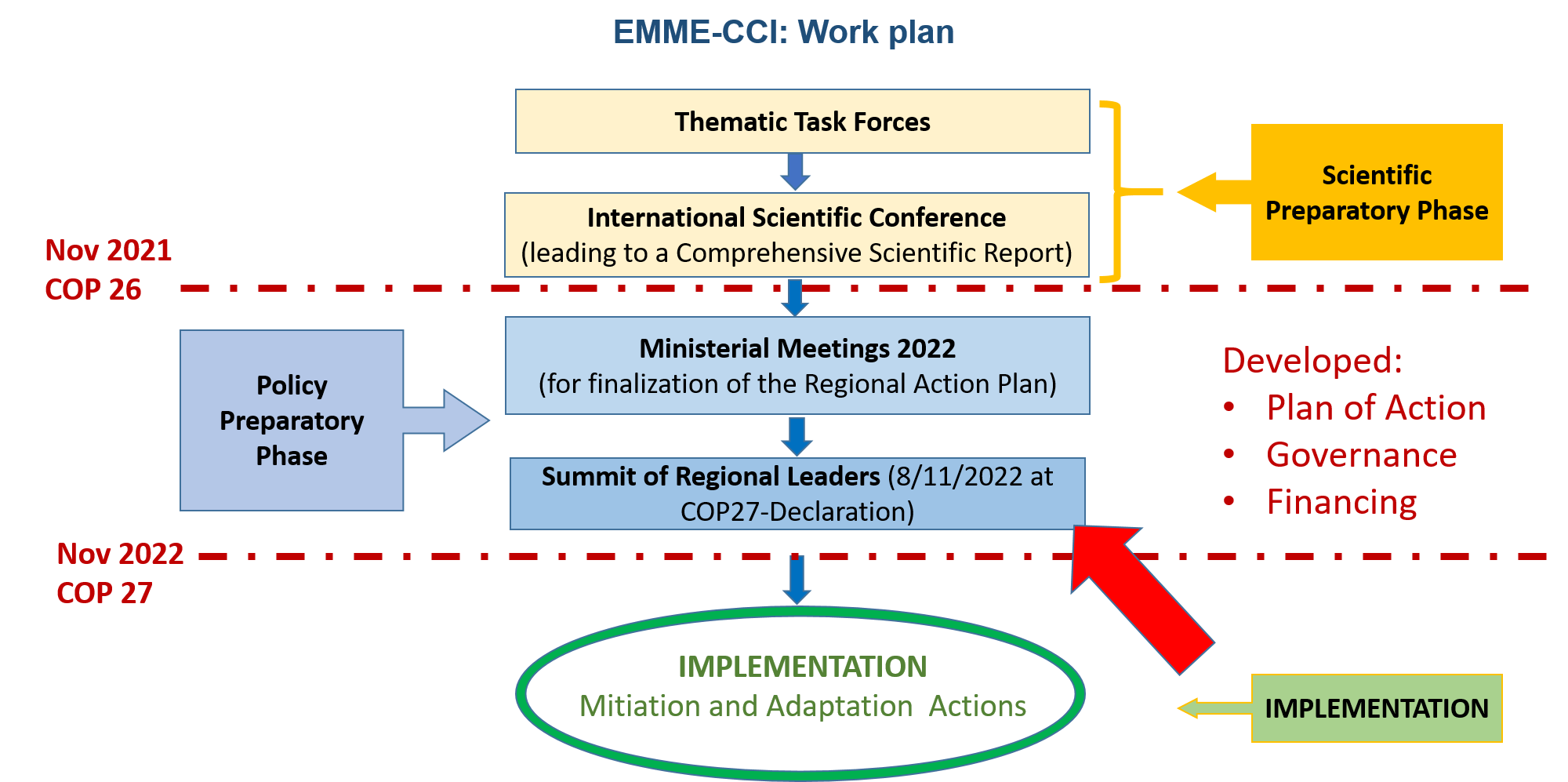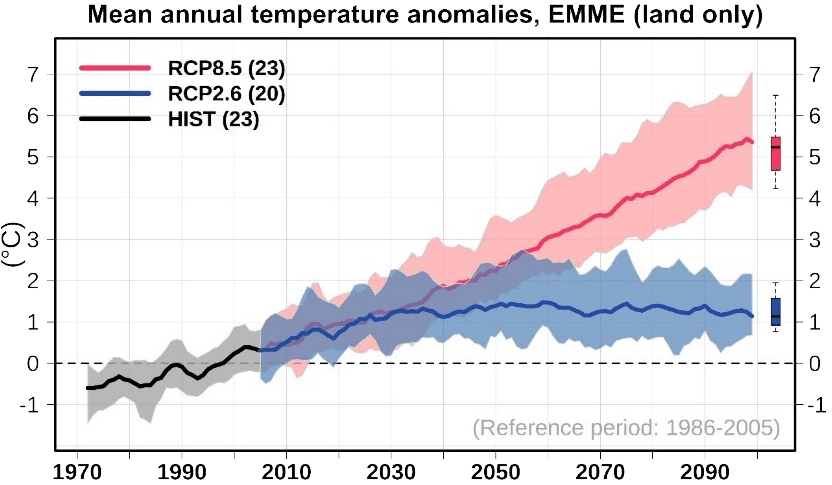The Initiative
The Initiative: Launch and Key Outcomes (2019-2022)
The Eastern Mediterranean and Middle East Climate Change Initiative (EMME-CCI) was initially launched in March 2019 by H.E. the President of the Republic of Cyprus. It matured into an ambitious scheme striving to coordinate a concerted regional effort to address the climate crisis. The Cyprus Institute (CyI) was assigned the coordination of the scientific component.
The scientific effort involved thirteen thematic Scientific Task Forces, comprised of over 240 scientists, who produced:
A detailed series of 13 area-specific scientific reports.
An EMME region Climate Change Action Plan, which is a set of proposed projects and services, providing science-based policy recommendations to support sustainable development and resilience. This plan places emphasis on transboundary measures aimed at ameliorating regional climate change effects and advancing relevant mitigation actions, in line with the Paris Agreement. An evolving Regional Action Plan and an organizational structure were tentatively agreed upon during two regional Ministerial Meetings in February and June 2022. The Initiative culminated in a high-level international conference, reinforcing Cyprus’ role as a hub for climate action.
Official Launch and Signatories (COP27, November 2022)
The EMME-CCI was officially launched at the COP27 summit held in Sharm El-Sheikh on November 8, 2022, at the invitation of H.E. the Presidents A.F. El-Sisi of Egypt and N. Anastasiades of Cyprus. Ten countries from the EMME region officially adopted a political declaration to launch the Initiative:
Signatories: Cyprus, Bahrain, Oman, Egypt, Greece, Iraq, Israel, Jordan, Lebanon, and the State of Palestine.
Notable Observers: United States, United Nations Economic Commission for Europe (UNECE), World Meteorological Organization (WMO), Food and Agriculture Organization (FAO), Union for the Mediterranean, and Sustainable Development Solutions Network (SDSN).
Relaunch and Expanded Mandate (2024)
In 2024, the new Government of Cyprus decided to relaunch the Initiative with an expanded mandate. It is coordinated by The Cyprus Institute in collaboration with the Ministry of Agriculture, Rural Development and Environment and the Ministry of Foreign Affairs. The new mandate consists of the following pillars:
Science to Policy Interface: The 13 Scientific Task Forces will be reactivated to produce updated reports focusing on the impact of climate change in specific thematic areas, which will be presented and communicated to regional policymakers.
Cross-border Projects: The Regional Action Plan will be updated based on the latest findings and will result in the identification and promotion of a small number of cross-border projects of broad regional interest, seeking the active participation of all countries of the Initiative.
Formation of the Regional Scientific Alliance for Climate Change (RSA-CC): This initiative, proposed by the CyI, aims to strengthen and institutionalize regional scientific collaboration by establishing a permanent, structured network of leading research institutions across the region and from observer countries. The RSA-CC will co-create shared research agendas, promote data sharing, facilitate joint funding proposals (e.g., under the future framework program), and develop capacity-building programs.
Climate Crisis in the EMME Region: A Global Threat
The 450 million inhabitants of the eighteen countries comprising the EMME region are at risk of a 5°C increase in mean annual temperature by the end of the century, under a “business as usual” scenario. This will lead to a catastrophe of unprecedented scale, inducing social collapse and mass migration, unless immediate action is taken on mitigation and adaptation through strong regional cooperation. The EMME-CCI initiative has a dual goal, namely, to initiate or enhance:
EMME-focused Research: A detailed understanding and accurate forecasting of regional climate change impacts, and the development of a science-based policy toolkit for the amelioration of impacts and the identification of appropriate per sector adaptation and mitigation measures.
EMME-Specific Policies: Coordination with transnational and multinational stakeholders and organizations to address the overall impacts of climate change with the aim to support the implementation of the Paris Agreement and National Plans, adopt specific action programs for distinct sectors, and investigate specific techno-economic scenarios. An indispensable component is the identification of the necessary resources for the implementation of such a program.
The establishment of the Regional Scientific Alliance for Climate Change (RSA-CC) is a critical step in consolidating scientific collaboration and policy support across the EMME region, providing the institutional framework needed to sustain long-term initiatives, mobilize resources, and coordinate responses to the shared climate challenges of the region.
GOVERNANCE SCHEME & REGIONAL ACTION PLAN
In two regional ministerial meetings, a Governance scheme comprising a Governing Council, the Initiative Secretariat and National Climate Offices has been developed and it is expected to be further refined and developed in the coming months. Extensive reports produced by the thirteen scientific thematic Task Forces, which include a plethora of proposed adaptation and mitigation measures, have been published and made available to country authorities.
The recommendations of the Task Forces provided the basis for the proposed evolving Regional Action Plan.

WORK PROGRAM & TIMELINE
The program and work plan are characterized by inclusiveness. The expanding bi-lateral, tri-lateral and multi-lateral initiatives of the Cyprus Government along with the international initiatives and organizations are being used and engaged maximally towards achieving success in this initiative.
The complexity, diversity and varying development of the countries of the region present both a challenge and an opportunity, which will be taken into account.

WHY FOCUS ON THE EASTERN MEDITERANNEAN & MIDDLE EAST REGION
A new study shows that Severe Atmospheric Pollution in the Middle East, Detrimental to Health and the Climate, is Attributable to Human-made Sources. Recent studies from prominent institutions, including the Intergovernmental Panel on Climate Change, have classified the Eastern Mediterranean & Middle East (EMME) region as a global climate change “hotspot” with particularly high vulnerability to climate change impacts. Overall warming of up to 5°C in this century is projected for the Eastern Mediterranean and the Middle East.
“Climate Change and Weather Extremes in the Eastern Mediterranean and Middle East”- “Reviews of Geophysics”, 28/6/2022
“Severe atmospheric pollution in the Middle East is attributable to anthropogenic sources”- “Nature.com journal /Communications earth & environment”, 22/9/2022

“under a business-as-usual scenario, by the end of the century the coolest years will be significantly warmer than the warmest years of the reference period”
“the EMME region will be subjected to unprecedented heat extremes”
G. Zittis, J. Lelieveld et al. 2021
The EMME region is already facing adverse effects such as heat waves, droughts and atmospheric dust storms which are only due to intensify in the coming decades. Without proper mitigation and adaptation actions, these harmful effects could soon lead to intolerable environmental conditions, ultimately forcing mass migration for the c. 500 million people living in the region. This is expected to have devastating implications for the EMME and the planet.
EMME is also a region with a complex geopolitical landscape, that historically has had limited dedicated scientific resources for climate research, which further adds to the challenge and urgency for concerted climate action in the region.

